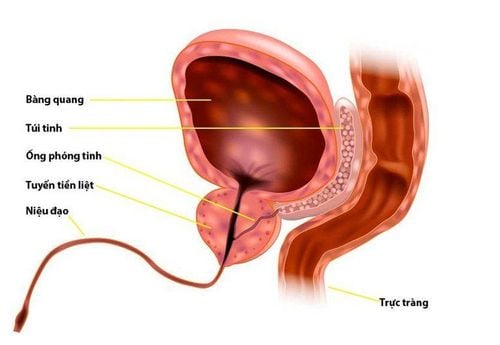Prostate calcification is a common condition in middle-aged men and can be associated with certain diseases of the prostate. Most cases of prostate calcification are asymptomatic and not dangerous for the patient.
1. What is prostate calcification?
Prostate calcification refers to the deposition of calcium in the prostate gland. Many of these cases do not lead to uncomfortable symptoms and are often discovered incidentally through ultrasound or X-ray imaging that reveals calcification.
Prostate calcification often develops after episodes of prostatitis. After inflammation occurs, a fibrotic reaction can lead to the formation of calcification points. Additionally, inflammation can block the prostate ducts, causing fluid buildup and subsequently leading to the formation of calcifications or stones.
While the exact cause of prostate calcification is unclear, it is commonly associated with conditions such as prostatitis, benign prostatic hyperplasia, prostate cancer, and procedures following prostatic hyperplasia surgery or cancer treatment.
2. Is Prostate Calcification Dangerous?
Generally, if prostate calcification remains asymptomatic, it does not require treatment and is considered benign. However, larger calcifications can lead to complications, such as:
- Chronic Prostatitis: Calcifications may press on the urinary tract, causing urine retention and allowing pathogenic bacteria to develop, leading to prostatitis. Symptoms of prostatitis include pain, discomfort during urination, bloody or cloudy urine, and bleeding or painful ejaculation. This chronic condition can be challenging to treat since antibiotics may not effectively penetrate the prostate gland.
- Impact on fertility: Chronic prostatitis may negatively affect semen quality and quantity. Semen serves to protect and nourish sperm; a decrease in semen volume reduces the likelihood of successful conception.
- Infections and urinary stones: The pressure from calcifications on the urinary tract can foster bacterial growth, leading to infections and the formation of stones in the bladder.
- Kidney function issues: Untreated urinary tract infections can lead to retrograde infections affecting the kidneys.
- Furthermore, prostate calcification is linked to conditions such as benign prostatic hyperplasia and prostate cancer, necessitating monitoring and treatment when required.

3. What to do if you have prostate calcification?
If prostate calcification causes symptoms such as urinary problems, hematuria (blood in urine), or sexual dysfunction,... treatment options may include medication or surgical interventions, such as endoscopic resection or open surgery. Additionally, patients should consider the following recommendations:
- Limit the intake of salty foods and spicy or hot seasonings.
- Drink sufficient amounts of water daily (about 2-2.5 liters) to help cleanse the urinary system and reduce the risk of infection.
- Engage in regular exercise, such as walking or yoga, which can benefit the pelvic area.
- Limit the consumption of alcohol, beer, coffee, tobacco, and other stimulants.
- Maintain daily hygiene, especially in the genital area, to prevent prostate infections.
- For those who are married, maintaining a regular sex life may help prevent prostate blockage.
- Perform physical therapy and prostate massage regularly to reduce gland blockage, lower the risk of infection, and enhance antibiotic penetration in the glandular tissue to improve bacterial elimination.

While prostate calcification is usually not dangerous and does not generally require treatment if asymptomatic, it can lead to infection. Therefore, individuals with prostate calcification should take necessary precautions to prevent worsening of the condition.
At Vinmec International General Hospital, we offer a screening package for urinary diseases, enabling early detection and effective treatment to avoid severe complications. This package includes:
- Specialized urology examination
- Urinary ultrasound
- Total PSA quantification
- Free PSA quantification
- Urine culture test.
These services help identify potential urinary diseases early, particularly prostate conditions (benign prostatic hyperplasia, prostate cancer) and urinary stones,... allowing for timely preventive measures.
To arrange an appointment, please call … or make your reservation directly HERE. You may also download the MyVinmec app to schedule appointments faster and manage your reservations more conveniently.













